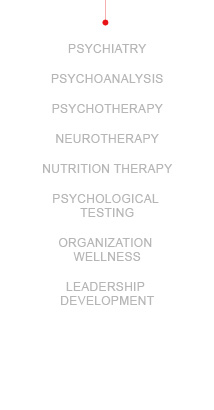At the Institute of Biobehavioral Medicine (IBBMed) we believe, the mind, body and spirit are intimately connected. And our multi-disciplinary approach integrates the fields of psychiatry, psychology, neuroscience and spirituality. Our holistic approach to mental and physical health combines ancient wisdom with the latest innovations in medical science and psychology. Our goal is to restore health and balance by promoting the natural healing processes of nature. Disorders such as, Chronic Pain, Fibromyalgia, Irritable Bowel and Chronic Fatigue share four important factors:
- Stress as a predetermining factor
- Neuronal sensitization
- Response to antidepressant medications
- Response to stress reduction and self-care.
Chronic Pain Syndrome
At the Institute of Biobehavioral Medicine (IBBMed), we believe the chronic pain is a complex syndrome. Surely, there may be physiological or perhaps anatomical reasons for your pain, but psychological factors may promote, propagate, exacerbate or even serve as the original cause of the pain.
For example, at IBBMed we recognize that with many people, depression causes unexplained physical symptoms such as back pain or headaches. Sometimes this kind of pain is the first or the only sign of depression. In a sense, pain and depression are closely related. Depression can cause pain — and pain can cause depression. Sometimes pain and depression create a vicious cycle in which pain worsens symptoms of depression, and then the resulting depression worsens feelings of pain.
Pain and the problems it causes can wear you down over time, and may begin to affect your mood. Chronic pain causes a number of problems that can lead to depression, such as trouble sleeping and stress. Disabling pain can cause low self-esteem due to work, legal or financial issues. Depression doesn’t just occur with pain resulting from an injury. It’s also common in people who have pain linked to a health condition such as diabetes or migraines.
To get symptoms of pain and depression under control, you may need separate treatment for each condition. However, some treatments may help with both. Because of shared chemical messengers in the brain, antidepressant medications can relieve both pain and depression. Psychological counseling (psychotherapy) can be effective in treating both conditions.
Stress-reduction techniques, meditation, staying active, journaling and other strategies also may help. Treatment for co-occurring pain and depression may be most effective when it involves a combination of treatments.

































